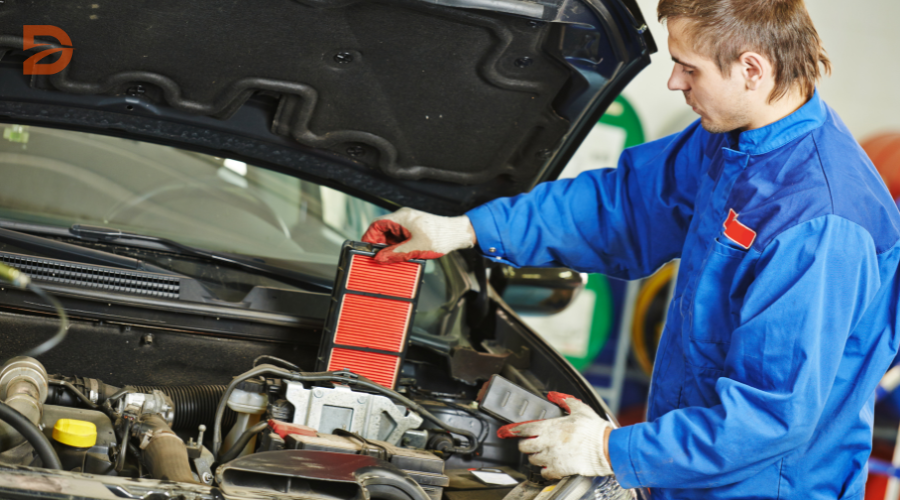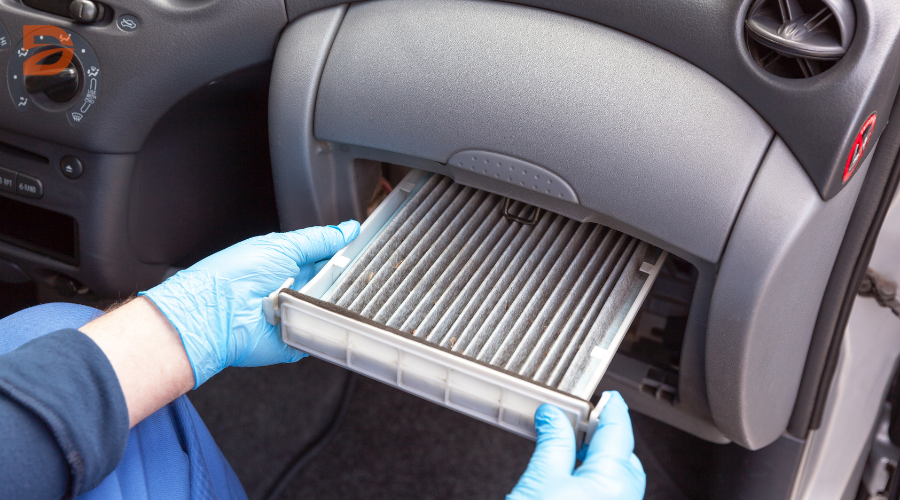Are you aware that the humble air filter in your car can have a significant impact on its overall performance and efficiency? Regular air filter replacements are crucial for maintaining your vehicle’s health and longevity. But just how important are these replacements, and what benefits can they provide? Uncover the answers in this comprehensive guide.
Key Takeaways
- Regular air filter replacements can increase fuel efficiency and power output.
- A clean air filter helps reduce harmful emissions from your vehicle.
- Proper air filter maintenance can extend the life of your engine by preventing contaminant buildup.
- Cabin air filters should be replaced every 15,000 to 25,000 miles or at least once a year.
- Engine air filters are recommended to be replaced every 15,000 to 30,000 miles.
The Importance of Regular Air Filter Replacement
Maintaining your car’s peak performance and efficiency starts with something as simple as regularly replacing the air filter. This unassuming component plays a vital role in ensuring your engine runs smoothly and efficiently. By understanding the benefits of timely air filter replacement, you can maximize your vehicle’s fuel efficiency, reduce emissions, and prolong the life of your engine.
Increased Fuel Efficiency
A dirty or clogged air filter can significantly impact your car’s fuel efficiency. When the filter is restricted, the engine has to work harder to draw in the necessary airflow, resulting in increased fuel consumption. By replacing the air filter as recommended, typically every 12,000 to 15,000 miles, you can maintain optimal airflow and enjoy enhanced fuel economy.
Reduced Emissions
The air filter is responsible for trapping dirt, debris, and other contaminants before they reach the engine. A compromised filter allows these particles to enter the combustion chamber, leading to an imbalance in the air-fuel mixture. This can result in higher emissions, contributing to environmental pollution. Regular air filter replacement helps maintain the optimal air-fuel ratio, reducing your vehicle’s carbon footprint.
Prolongs Engine Life
Neglecting to replace your air filter can have dire consequences for your engine’s longevity. When the filter is clogged, the engine has to work harder to draw in the necessary air, leading to increased wear and tear. This can shorten the engine’s lifespan and potentially result in costly repairs down the line. By prioritizing air filter replacements, you can safeguard your engine and enjoy a longer, more reliable performance.
| Benefit | Importance |
|---|---|
| Fuel Efficiency | A clean air filter can improve fuel economy by up to 10% compared to a clogged one. |
| Emissions Reduction | Replacing a dirty air filter can lower emissions by up to 6%, contributing to a cleaner environment. |
| Engine Protection | Proper air filter maintenance can extend engine life by up to 50,000 miles, saving you from costly repairs. |
“Replacing your air filter is one of the easiest and most cost-effective ways to maintain the health of your vehicle’s engine.”
Do Air Filters Improve Performance?
When it comes to enhancing your car’s performance, the air filter often gets overlooked. However, research shows that upgrading to a high-quality air filter can provide a noticeable boost in power and efficiency. Performance air filters like those from K&N and CarQuest have been shown to increase horsepower by 3 to 5 HP on average.
The key is that for an engine to run at its maximum potential, it needs to be able to intake as much oxygen as possible. While basic air filters for everyday driving can only go so far, a properly matched performance air filter can make a significant difference in your vehicle’s power output and overall performance.
| Air Filter | Horsepower | Torque |
|---|---|---|
| Stock | 160.5 HP | 137.5 lb-ft |
| CarQuest Performance | 163.3 HP | 140.0 lb-ft |
| K&N Performance | 164.3 HP | 142.5 lb-ft |
However, it’s important to note that not all vehicles are designed for easy modifications. While cars like the Toyota Supra or Mitsubishi Lancer Evolution are engineered to be tuned, simply swapping out the air filter on a Volkswagen Golf may not necessarily improve performance and could disrupt the engine’s delicate balance with the transmission and gearbox.
Ultimately, the benefits of upgrading your air filter will depend on your specific vehicle, driving needs, and overall modification goals. But for many car enthusiasts, a high-quality performance air filter can be a cost-effective way to unlock hidden power and improve the overall driving experience.
Signs Your Air Filter Needs Replacement
Regularly inspecting your air filter can help you identify when it’s time for a replacement. One of the most obvious signs is visible dirt and damage. If the air filter is caked with dust, or debris, or appears severely worn, it’s likely time to swap it out. A clogged air filter can severely restrict airflow, reducing your engine’s efficiency and performance.
Overheating and Power Reduction
Another telltale sign that your air filter needs attention is if your vehicle starts to overheat or experiences a noticeable power loss, especially during acceleration. A dirty air filter restricts the necessary airflow to the engine, which can lead to these issues. Addressing a clogged air filter can help restore your car’s power and prevent potential engine damage from overheating.
Loose Mounting Points
Ensuring the air filter’s mounting points are secure is also important. If the filter is not properly secured, it can allow unfiltered air to enter the engine, defeating the purpose of the filtration system. Inspecting the filter’s fit and ensuring it’s snugly in place is a crucial step in maintaining optimal engine performance.
By being vigilant about the condition of your air filter and replacing it as needed, you can help improve your vehicle’s fuel efficiency, reduce emissions, and extend the life of your engine. Manufacturers typically recommend changing the air filter every 12,000 miles, but driving conditions may necessitate more frequent replacements.
Air filter replacements, engine health
Maintaining the health of your vehicle’s engine is crucial for its longevity and optimal performance. One of the key components in this endeavor is regular air filter replacements. Experts recommend replacing your engine air filter every 12,000 to 15,000 miles, or annually, to ensure efficient airflow and safeguard your engine’s integrity.
A clean air filter is essential for your engine’s optimal function and fuel efficiency. When the air filter becomes clogged with dirt and debris, it restricts the flow of air into the engine, leading to reduced engine performance, increased emissions, and even potential long-term engine damage. By staying proactive with your air filter maintenance, you can extend the life of your engine and enjoy better overall vehicle performance.
- Recommended air filter replacement interval: every 6,000 to 10,000 miles or as specified by the vehicle manufacturer’s guidelines.
- Consequences of neglecting air filter maintenance: increased fuel consumption, reduced acceleration, decreased engine performance, and potential engine misfires.
- Percentage of clogged air filters leading to engine damage: significant risk of engine running lean with increased fuel consumption and overheating.
Don’t let a neglected air filter jeopardize the health of your engine. Regular preventive maintenance, including timely air filter replacements, is the key to ensuring your vehicle’s engine protection and long-term performance. Trust the experts at Integrity 1st Automotive to keep your car running at its best.
Conclusion
Regular air filter replacements are a simple yet crucial maintenance task for your vehicle’s health and performance. By replacing a clogged air filter, you can improve fuel efficiency, reduce emissions, and prolong the life of your engine. It’s important to inspect your air filter regularly and replace it at the recommended intervals, especially if you drive in particularly dusty or polluted conditions.
Staying on top of this maintenance can save you money in the long run by avoiding more serious engine problems and ensuring your car runs at its best. Whether you’re driving a brand-new luxury SUV or a well-worn commuter car, keeping your air filter in top condition is essential for optimal engine performance and environmental responsibility.
At Master Tech Diagnostics and Repairs, we understand the importance of air filter maintenance and make it a priority during every vehicle service. Our experienced technicians will thoroughly inspect your air filter, clean the surrounding components, and install a new filter if necessary, ensuring your car runs at peak efficiency. Trust the experts at Master Tech to keep your vehicle performing at its best.
FAQ
Why are regular air filter replacements crucial for my car’s performance?
Regular air filter replacements are crucial for maintaining your car’s overall performance and engine health. By replacing a clogged air filter, you can increase fuel efficiency, reduce emissions, and prolong the life of your engine. A clean air filter ensures a consistent and clean flow of air into the engine, which aids the combustion process and helps your car run at maximum efficiency.
How can a dirty air filter affect my car’s performance?
A dirty or damaged air filter limits the amount of air flowing into your car’s engine, making it work harder and use more fuel. Replacing a clogged air filter can increase fuel efficiency and improve acceleration, depending on your car’s make and model. Additionally, a dirty air filter can cause an imbalance in the air-fuel mixture, leading to increased engine deposits, rough idling, and higher emissions.
Do air filters improve performance?
For an engine to run at its maximum performance with maximum efficiency, it needs to get as much oxygen into the engine as possible. While basic performance air filters for road cars can only go so far in terms of performance output, they might decrease fuel efficiency and engine life if not properly matched with the vehicle. Certain cars, like the Toyota Supra or Mitsubishi Lancer Evolution, are designed to be easy to modify, but modifying the air filter alone on a car like the Volkswagen Golf may not necessarily improve performance and could disrupt the way the engine works with the gearbox and transmission.
How can I tell if my air filter needs to be replaced?
Regularly inspecting your air filter can help you identify when it’s time for replacement. If the air filter is caked with dust or debris, it can severely clog the filter, reducing airflow and your engine’s efficiency. You may also notice signs of wear, such as visible dirt or damage, which indicate it’s time for a replacement. Additionally, if your vehicle starts to overheat or experiences a noticeable power reduction, especially during acceleration, it’s a sign that the air filter is likely clogged and restricting the necessary airflow to the engine. Ensuring the air filter’s mounting points are secure is also important to prevent unfiltered air from entering the engine.
How often should I replace my engine air filter?
Replacing your engine air filter every 12,000 to 15,000 miles, or annually, is crucial for maintaining peak performance and protecting your vehicle’s engine. A clean air filter ensures efficient airflow, which is essential for your engine’s optimal function and fuel efficiency. Neglecting air filter replacement can lead to reduced engine performance, increased emissions, and even severe engine damage over time. By staying proactive with air filter maintenance, you can extend the life of your engine and enjoy better overall vehicle performance.











